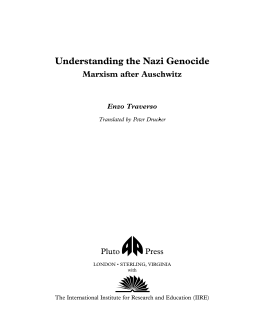
Additional Information
Book Details
Abstract
'...this is a genuinely original contribution to our understanding. Students of the Holocaust sometimes worry that too much analysis may immunise us against its unbelievable horror. Traverso avoids that risk with great sensitivity and imagination.' Socialist Review
In Understanding the Nazi Genocide Enzo Traverso sustains a dialogue with writings on the Shoah from Hannah Arendt to Daniel Goldhagen by drawing on the critical and heretical Marxism of Walter Benjamin and the Frankfurt School, which grasped late capitalism’s pent-up capacity for destructive upheavals exacerbated by bureaucratic organisation and advanced technology.
After Auschwitz, Hiroshima and the gulag, the old warning slogan - socialism or barbarism - formulated by European Marxists at the beginning of twentieth century needs to be seriously ‘revised’. The choice we face today is no longer between the progress of civilisation and a fall into ancient savagery, but between socialism conceived as a new civilisation and the destruction of humankind. For Traverso the Warsaw Ghetto uprising is an image of what should impel us to rebel: not a sense of inevitable victory, but an ethical imperative.
'...this is a genuinely original contribution to our understanding. Students of the Holocaust sometimes worry that too much analysis may immunise us against its unbelievable horror. Traverso avoids that risk with great sensitivity and imagination.' Socialist Review
In Understanding the Nazi Genocide Enzo Traverso sustains a dialogue with writings on the Shoah from Hannah Arendt to Daniel Goldhagen by drawing on the critical and heretical Marxism of Walter Benjamin and the Frankfurt School, which grasped late capitalism’s pent-up capacity for destructive upheavals exacerbated by bureaucratic organisation and advanced technology.
After Auschwitz, Hiroshima and the gulag, the old warning slogan - socialism or barbarism - formulated by European Marxists at the beginning of twentieth century needs to be seriously ‘revised’. The choice we face today is no longer between the progress of civilisation and a fall into ancient savagery, but between socialism conceived as a new civilisation and the destruction of humankind. For Traverso the Warsaw Ghetto uprising is an image of what should impel us to rebel: not a sense of inevitable victory, but an ethical imperative.
Table of Contents
| Section Title | Page | Action | Price |
|---|---|---|---|
| Contents | iii | ||
| IIRE Notebooks for Study and Research | vi | ||
| Foreword | vii | ||
| Introduction | 1 | ||
| 1. Auschwitz, Marx and the Twentieth Century | 7 | ||
| Auschwitz and the Final Solution | 9 | ||
| The Sociology of Auschwitz | 14 | ||
| Auschwitz and Modernity | 16 | ||
| Rereading Marx after Auschwitz | 19 | ||
| 2. The Blindness of the Intellectuals: Historicising Sartre’s \"Anti-Semite and Jew | 26 | ||
| 3. On the Edge of Understanding: From the Frankfurt School to Ernest Mandel | 42 | ||
| The Frankfurt School | 46 | ||
| Ernest Mandel | 50 | ||
| 4. The Uniqueness of Auschwitz: Hypotheses, Problems and Wrong Turns in Historical Research | 63 | ||
| The Uniqueness of Auschwitz: Definition and Comparisons | 66 | ||
| Uniqueness of Memory and Uniqueness in History | 71 | ||
| Auschwitz and the Uniqueness of the West | 73 | ||
| The Uniqueness of Auschwitz and the Public Use of History | 75 | ||
| 5. The Debt: The Warsaw Ghetto Uprising | 79 | ||
| Poland's Jews between Passivity and Resistance | 80 | ||
| The Ghetto | 82 | ||
| The Uprising | 84 | ||
| A Revolt Left to its Fate | 86 | ||
| The Proper use of Memory | 88 | ||
| 6. The Shoah, Historians and the Public Use of History: On the Goldhagen Affair | 90 | ||
| A Monocausal Explanation | 92 | ||
| Minimising the Gas Chambers | 97 | ||
| Goldhagen's German Triumph | 102 | ||
| Conclusion | 105 | ||
| Notes | 109 | ||
| Introduction | 109 | ||
| 1. Auschwitz, Marx and the Twentieth Century | 109 | ||
| 2. The Blindness of the Intellectuals | 112 | ||
| 3. On the Edge of Understanding | 117 | ||
| 4. The Uniqueness of Auschwitz | 125 | ||
| 5. The Debt | 130 | ||
| 6. The Shoah, Historians and the Public Use of History | 132 | ||
| Conclusion | 135 | ||
| Bibliography | 136 | ||
| Index | 147 | ||
| Action Française, 31 | 31 | ||
| Adler, Victor, 21 | 21 | ||
| Adorno, Theodor | 7 |
